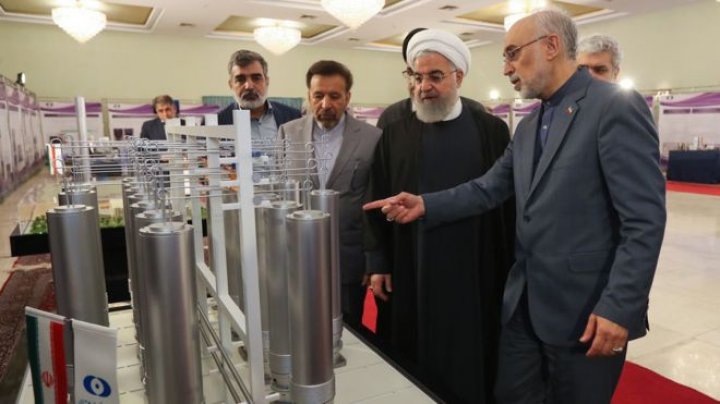European powers remain committed to the Iran nuclear deal but "reject any ultimatums" from Tehran to prevent its collapse
 foto: PUBLIKA.MD
foto: PUBLIKA.MD
European powers have said they remain committed to the Iran nuclear deal but that they "reject any ultimatums" from Tehran to prevent its collapse, writes bbc.com.
Iran announced on Wednesday that it had suspended two commitments under the 2015 accord in response to the economic sanctions the US reimposed last year.
It also threatened to step up uranium enrichment if it was not shielded from the sanctions' effects within 60 days.
The EU, UK, France and Germany noted "with great concern" Iran's move.
Under the nuclear deal, which is known as the Joint Comprehensive Plan of Action (JCPOA), Iran agreed to limit its nuclear activities in return for sanctions relief.
But a year ago US President Donald Trump abandoned the deal, saying it was "horribly one-sided" and needed to be renegotiated, and began reinstating sanctions. In November, those targeting Iran's oil and financial sectors took effect.
Iran's economy is now sliding towards a deep recession, the value of its currency has dropped to record lows, and its annual inflation rate has quadrupled.
What has Iran done and why?
Under the JCPOA, Iran agreed to limit its enrichment of uranium, which can be used to make reactor fuel but also nuclear weapons, and to sell surplus stocks.
It also said it would redesign a heavy-water nuclear reactor at Arak, whose spent fuel would contain plutonium suitable for a bomb, and sell any surplus heavy water.
President Hassan Rouhani said on Wednesday that Iran would stop immediately sales of enriched uranium and heavy water, allowing it to build up its stockpiles.
The sales would resume if the remaining parties to the JCPOA - the UK, France, Germany, Russia and China - met their commitments to protect Iran's banking and oil sectors within 60 days, he added.
If not, Iran will no longer observe a key commitment not to enrich uranium to concentrations higher than the 3.67% required for reactor fuel. Weapons-grade uranium is at least 90% enriched.
The country will also halt the redesign of the Arak heavy-water reactor.
"The Iranian people and the world should know that today is not the end of the JCPOA," Mr Rouhani said. "These are actions in line with the JCPOA."
How have European powers responded?
The EU's foreign policy chief and the foreign ministers of France, Germany and the UK stressed that the JCPOA was "a key achievement of the global nuclear non-proliferation architecture, which is in the security interest of all".
"We strongly urge Iran to continue to implement its commitments under the JCPOA in full as it has done until now and to refrain from any escalatory steps," a joint statement issued on Thursday said.
We reject any ultimatums and we will assess Iran's compliance on the basis of Iran's performance regarding its nuclear-related commitments under the JCPOA and the NPT (Treaty on the Non-Proliferation of Nuclear Weapons)."
The European powers expressed regret about the renewed US sanctions and said they were "determined to continue pursuing efforts to enable the continuation of legitimate trade with Iran".
Those efforts include a "special purpose vehicle" that would essentially allow goods to be bartered between Iranian and foreign companies without direct financial transactions. However, the mechanism - known as Instex - is not yet operational.
What has the US said?
During a visit to London on Wednesday, US Secretary of State Mike Pompeo said Iran was being "intentionally ambiguous".
"We'll have to wait to see what Iran's actions actually are. They've made a number of statements about actions they've threaten
Later, President Trump announced additional sanctions targeting Iran's steel, aluminium, iron and copper sectors.
The White House said they were Iran's largest non-petroleum-related sources of export revenue and made up 10% of its export economy.
"Tehran can expect further actions unless it fundamentally alters its conduct," Mr Trump warned.
His administration has put forward 12 requirements for a new nuclear dealand the lifting of sanctions, including halting uranium enrichment altogether, as well as ending its development of ballistic missiles, involvement in conflicts elsewhere in the Middle East, and support of terrorist groups.